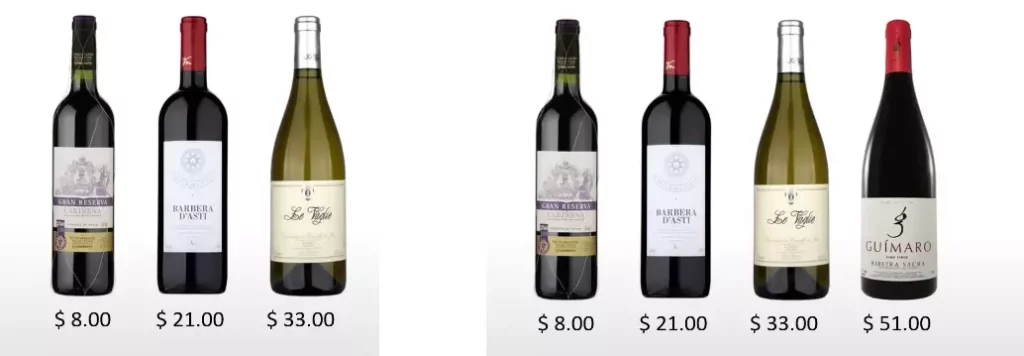Table of Contents:
- The psychology of money – absurdities people commit
- 1.) Importance of wage (income) increases
- 2.) New refrigerator vs new car
- 3.) Vacation on sale
- 4.) Relativity of value
- 5.) Loss aversion
- Model situations
- Conclusion – The psychology of Money
Last updated December 6th, 2023 00:16
People handle money and think about it in various ways. However, upon closer examination of people’s behavior in certain situations, interesting phenomena arise that cannot always be rationally explained. Despite encountering situations that are paradoxically disadvantageous, people tend to lean towards them rather than situations that have positive outcomes. Let’s take a look at a few examples of how the psychology of money works in practice. Perhaps you may even recognize yourself in some of these cases. If so, the comments section is open below.
The psychology of money – absurdities people commit
1.) Importance of wage (income) increases
In the first example, we demonstrate how regular wage increases are more important to people than the actual amount they will earn in the end. For this example, let’s consider a three-year project. You are presented with two clear salary offers.
Offer A
- First year: $60,000
- Second year: $50,000
- Third year: $40,000
- Total: $150,000
Offer B
- First year: $35,000
- Second year: $45,000
- Third year: $55,000
- Total: $135,000
As you can see, Offer A is more advantageous. In comparison to Offer B, it allows you to earn $15,000 more at the end of the three-year project. However, from conducted experiments, it has been found that a larger portion of people tend to lean towards Offer B, even though they ultimately end up with much less money. This is because people are inclined towards the fact that they want to have a higher salary each year than the previous one. And this aspect is so important to them that they are willing to sacrifice lower earnings in the end. It’s solely for the feeling that their salary will have an increasing, rather than decreasing, trajectory.
2.) New refrigerator vs new car
Let’s create another hypothetical situation. Your refrigerator has broken down, and you urgently need to buy a new one. Next to your house, in a store, they have the model you selected for $8,000. However, 5 kilometers outside the city, the same model is available but on sale for $7,000. How will you decide? Most people would get in their car and drive outside the city to buy the refrigerator, in order to save $1,000.
Now, let’s say you are buying a new car. Next to your house, there is a car dealership where they sell your dream car for $800,000. Similar to the refrigerator, there is another car dealership outside the city where the same car is on sale for $799,000. Would you go out of town to buy the car? I assume that you have already answered no.
And the question is, why? You would save the same $1,000, just like with the refrigerator.
3.) Vacation on sale
Another absurdity in behavior regarding finances can be demonstrated with a dream vacation. Let’s outline two scenarios.
Scenario 1
The dream vacation costs $20,000, but now it is on sale for $16,000.
Scenario 2
The dream vacation costs $20,000, and now it is in a special offer for $7,000. You call the travel agency, but they inform you that the offer is no longer valid, and the price has drastically increased to $15,500.
As you probably guessed, most people would reject such an offer in Scenario 2, even though the price would still be $500 lower than in Scenario 1. Once again, there is a psychological effect where the offer in Scenario 1 appears advantageous, while the second one seems disadvantageous because it was supposed to be cheaper. Interesting, isn’t it?
4.) Relativity of value
People often evaluate the value of things based on surrounding perceptions. They relativize the value of an item in relation to what is around it or the context it is in. A great example can be a bottle of wine that you will be buying for a dinner with friends. Let’s take a look at two examples.

In the first case, people usually choose between the first and second wine. Wine for $8 may not be bad, and the wine for $21 represents a clear middle ground. However, in the second case, few people will buy the $8 wine, and most will decide between the wines priced at $21 and $33. This is because many people don’t want to appear cheap among friends and won’t buy the cheapest wine available, even though they might have done so in relation to the prices in the first scenario.
This phenomenon is often exploited by traders who are aware of this fact. People compare the quality of wine and the price they are willing to accept in relation to the wines they see nearby. The $8 wine, even though it’s the same wine, has a different value on the left and a different value on the right. At least in the relative sense.
5.) Loss aversion
As humans, we are psychologically inclined towards loss aversion. Loss itself is much more sensitive and impactful than the joy of gain. Simply put, if we lose $1,000, it can ruin our week, if not more. On the other hand, if we gain $1,000, the joy of such a gain will not have a long-lasting effect. Again, for simplicity, I will provide two examples.
Model situations
Situation 1
You have the opportunity to participate in a simple experiment to receive $1,000.
- Risk: You flip a coin at the end, and if it lands on heads, you will receive an additional $1,000. If it lands on tails, you won’t get anything extra and will leave with just $1,000.
- No risk: You will receive an additional $500 without taking any chances.
Situation 2
You have the opportunity to participate in a simple experiment to receive $2,000.
- Risk: You flip a coin at the end, and if it lands on heads, you will lose $1,000. If it lands on tails, you will walk away with the full amount of $2,000.
- No risk: Instead of flipping the coin, you choose not to take the risk and will receive only $1,500.
In the first situation, most people choose not to take the risk and take the $500. In the second situation, it’s the opposite, and most people are willing to take the risk. This is due to the aversion to loss. In the first case, you’re not risking anything and can only gain. In the second case, if you choose not to take the risk, you automatically lose $500, which you wouldn’t have to lose if you flipped the coin. Despite the fact that in the second case, there’s a 50% chance of losing $1,000, most people will take the risk due to the aversion to an automatic loss of $500.
Conclusion – The psychology of Money
As you can see, human behavior in relation to money can be truly absurd at times. Our thinking is not always based on logic but rather on an emotional level. How about you? Have you found yourself in any of these examples?
The website is created with care for the included information. I strive to provide high-quality and useful content that helps or inspires others. If you are satisfied with my work and would like to support me, you can do so through simple options.
Byl pro Vás tento článek užitečný?
Klikni na počet hvězd pro hlasování.
Průměrné hodnocení. 0 / 5. Počet hlasování: 0
Zatím nehodnoceno! Buďte první
Je mi líto, že pro Vás nebyl článek užitečný.
Jak mohu vylepšit článek?
Řekněte mi, jak jej mohu zlepšit.

Subscribe to the Newsletter
Stay informed! Join our newsletter subscription and be the first to receive the latest information directly to your email inbox. Follow updates, exclusive events, and inspiring content, all delivered straight to your email.
Are you interested in the WordPress content management system? Then you’ll definitely be interested in its security as well. Below, you’ll find a complete WordPress security guide available for free.

